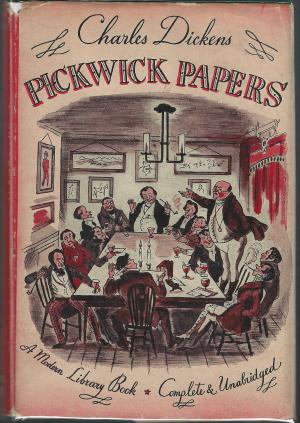Fat times have not vanished in the United States. We still have an obesity epidemic, for one thing, and the metaphorical blubber of more digital information than anyone needs; both have grown out of the excesses of richer years. It is an odd condition, but Dickens foresaw it nearly two hundred years ago and devised strategies for coping with it. The Pickwick Papers, his first novel, gave the 1830s a formerly successful and presently unemployed character who lives happily with his literal fatness in a realm metaphorically plump with information: Samuel Pickwick, an amiable amateur researcher drawn to absurd minutiae in a world brimming with social chitchat and with the kind of free time that allows studies on “the mighty ponds of Hampstead” and a “Theory of Tittlebats.”
The novel begins as portly Pickwick, having accrued a comfortable amount of wealth and status, sets out to gather and share some information just for the joy of it. As he later remarks, “Nearly the whole of my previous life having been devoted to business and the pursuit of wealth, numerous scenes of which I had no previous conception have dawned upon me—I hope to the enlargement of my mind, and the improvement of my understanding.” Having enlarged himself by eating up so much of the world, that is, he now seeks to make his understanding commensurate with his body. (Of course, it would have been better if he’d sought understanding first, but then we wouldn’t have a novel.)
Because it comes from his love for the world that has fed him so well, Pickwick’s wish to learn is fundamentally social, so he puts together a society of amateur knowledge-sharers who seek “to forward, from time to time, authenticated accounts of their journeys and investigations, of their observations of character and manners, and of the whole of their adventures, together with all tales and papers to which local scenery or associations may give rise.” After their society is founded, the Pickwickians plunge almost immediately into misadventure, as does Pickwick himself, but his resulting lack of profit or of any particular achievement is more than compensated for by his other gains: knowledge of humanity’s wild variety, the fellowship of like-minded knowledge-seekers, the pleasures of ever-refreshing novelty.
The Pickwick Papers, which is itself now freely available in the public domain, may in fact be the most appropriate book for understanding how we can better live with that expanding domain—a novel that depicts the friendly, nonprofit circulation of all-you-can-eat information. For, as you may have noticed, Pickwick cuts a familiar figure today, a composite of what you get immediately after fat times: residual leisure, lingering obesity, a motivating recognition of some incomprehensible thing beneath all the fatness. And so, unwittingly, he provides reassurance to our own unemployed dawdlers, those who might pursue their own errant, amateur investigations in a digital social network.“I shall never regret,” he says, “having devoted the greater part of two years to mixing with different varieties and shades of human character, frivolous as my pursuit of novelty may have appeared to many.” As he announces near the close of his story, “If I have done but little good, I trust I have done less harm.”
To put a finer point on it, given the time and luxury at his disposal, Pickwick’s modern-day avatar might have been an internet troll. As it happens, however, he is too much inspired by the fellowship that can accompany his freewheeling curiosity for that—he’s a good man with an open mind. But his adventures do expose the problem of the proto-troll in this milieu, one of whom we meet in the form of a villainous doppelgänger, mostly called “the fat boy,” who is Pickwick gone wrong, more avaricious and less intellectually driven. Like Pickwick, the fat boy pursues pleasure rather formlessly, but he does so with greater self-indulgence. He is always falling asleep, sometimes while eating. When not otherwise occupied, he villainously dogs the Pickwickians, keeps track of amorous rendezvous, stabs Pickwick in the leg, and so on. He does not, it should be said, make much sense, either to the Pickwickians or to the reader.
Pickwick ultimately triumphs, happy with his lot, while at the fat boy we shake our heads in confusion. Let this set a precedent for us as we make our own way through a world grown pudgy with abundantly accessible information: broadened intellectual meandering can help us live sociably, Pickwickianly, through our teeming digital surplus; it can, in turn, move us beyond the isolated malevolence of the small-minded. Such a victory of the kindly amateurs over the trolls, if it is to occur, may be slow, but it must happen. We simply need more Pickwicks.





